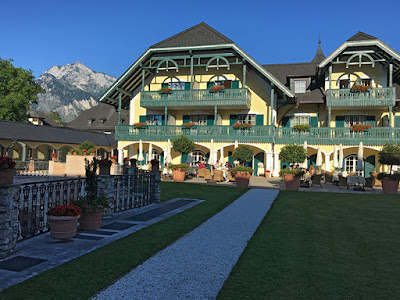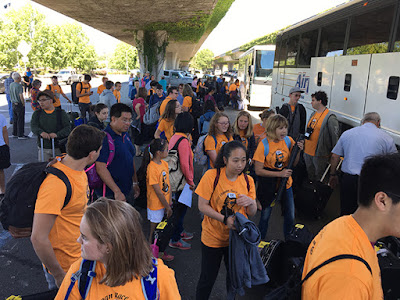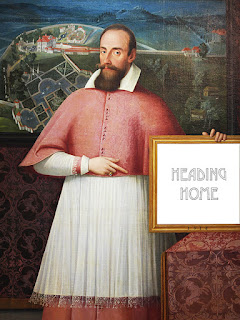 |
Our hotel, Hotel Friesacher, Salzburg
Photo: Colin Talcroft |
Salzburg today is known for music, but it was salt that made Salzburg prosperous. The Youth Orchestra musicians got a taste of both today. After a bountiful breakfast buffet—overflowing with choices: whole grain breads, hams, salamis, smoked salmon, eight or nine cheeses, liverwurst, cereals, eggs, omelettes, cakes, pastries, and more—buses left our quintessentially Austrian hotel for the center of Old Salzburg where guides led a walking tour that included views of the Mozart Statue in the Mozartplatz and of the Nonnberg Convent (where the real Maria Von Trappe studied), the Hohensalzburg Fortress, and a visit to Mozart's birth house.
 |
At the Mozart birth house. This is the instrument on which
Mozart composed The Magic Flute.
Photo: Colin Talcroft |
Molly Zhou (oboe) was impressed by the variety of breakfast options, saying "It was a cultural thing. There were lots of choices we wouldn't have had in the US for breakfast—like all kinds of cheeses, things not traditional at home." About Mozart's birth house, she said "It was amazing to be in the room where Mozart was born. Just being there was exciting."
Some of the displays were hard to see. The guide moved quickly and the small rooms were overflowing with other tour groups, but some of the artifacts made a deep impression. Of special interest was a small, improbably modest-looking keyboard instrument that the guide revealed was the instrument Mozart used to compose some of his last and greatest compositions, including
The Magic Flute. Amelia Malpas (cello) said about the instrument "It was amazing to see an object used to create a piece of music that has become a human cultural treasure."
 |
Theo Clarke (bassoon), Max Belove (trumpet), Chiara Rackerby (oboe),
Devon Bolt (flute), and Aidan Manousos (bassoon) exploring
the Salzburg fortifications.
Photo: Colin Talcroft |
The students were left in small groups of their own choosing to find lunch and to explore the fortifications that dominate the town, accessed by a steep, fast funicular railway. Yekaterina Lynch (percussion) said "It was very dramatic. You go up so fast and suddenly you see the whole city—a 360-degree view!" Theo Clarke (bassoon) said "The fort was beautiful, but the scenery around the fort was even more beautiful. The mountains with the villages made for an extraordinarily scenic view."
The second half of the afternoon was the highlight for many: the group toured the salt mine at Hallein that made Salzburg wealthy. More about that in the next post!





Enjoy
ReplyDelete